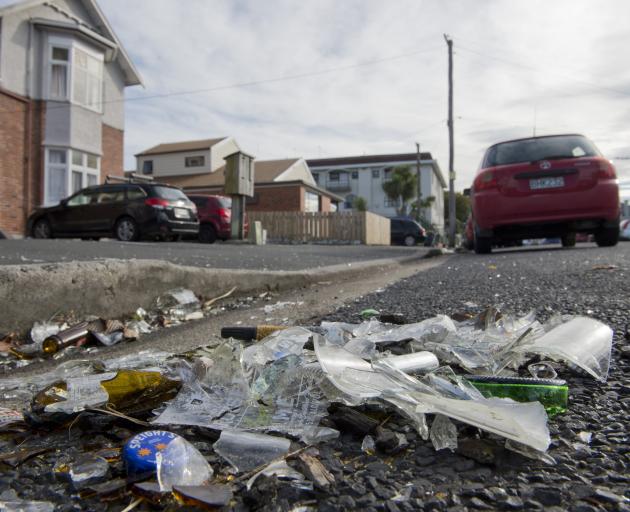
The Dunedin City Council hearings subcommittee will consider submissions on the draft replacement of the local alcohol policy today.
Several submitters, including police and the University of Otago proctor, asked that the council add to the policy and ban the sale of some alcoholic beverages in glass containers at all North Dunedin off-licences. They said the ban would address broken glass being spread on the streets of the student quarter.
At present, the draft policy does not contain any restriction on the type of container in which alcohol is sold.
Liquorland franchisee Chris Hart said the suggestions were "non-workable" and would not address the problem.
Poor student behaviour was dictating the proposal but responsibility would be put on businesses in the area, he said.
"Since when does a minority group, i.e. the students, get to control such a narrative around drinking when there’s no self-responsibility?"
Mr Hart, who owns Liquorland Leith St and Liquorland Meenans, in Great King St, said a proposed exclusion area would be no barrier for students wanting glass bottles.
"They’ll just drive outside of that ... zone and buy bottles — the powers of authority are very, very naive to think that they won’t.
"This would have a huge impact, because all it does is it drives people into different areas."
The council and university should be doing more work with students to enable good behaviour, Mr Hart said.
"The solution is put back the bins and actually hold people to account for throwing away rubbish or making a mess."
Mr Hart wanted the committee to take a "common sense" approach to the suggestions.
Foodstuffs South Island general manager retail and property Tim Donaldson did not comment on how the proposal would affect the Centre City and Gardens New World supermarkets but said the company was focused on responsibly serving the community.
"We will continue to review and submit on any changes to the local alcohol policy."
In his submission, university proctor Dave Scott said broken glass was a "perennial" issue and affected people throughout the North Dunedin community.
While cleanup initiatives had led to improvements, the problem remained widespread — broken glass injured people, cut car and bike tyres and was a significant ongoing expense for the city council, he said.
Beer and RTD bottles should be the main targets of any ban.
Sergeant Stephen Jones agreed — suggesting, on behalf of New Zealand Police, off-licences within 1.2km of the university be banned from selling any alcoholic beverage in a glass container 500ml or less.
"Police attending incidents of assaults and property damage, victim admissions to the Dunedin Hospital emergency department, costs to the ratepayer through DCC waste management services and overall community impact are all indicators of a requirement for the condition banning the sale of glass products from off-licence premises in this area," his submission said.
Bede Crestani, the father of University of Otago student Sophia Crestani who died during a party five years ago, said the alcohol industry needed to take responsibility for the way its products and containers were used.
"It would be reasonably easy to ... reduce the top 25% of excessive use and reduce the broken glass damage to the city.
"If they meaningfully engaged with North Dunedin, they could see the problems and find ways to keep their customers safe."
The OUSA did not call for a ban, but wanted promotion of non-glass vessels, ideally at all times, but at least during periods of significant alcohol consumption such as St Patrick’s Day.












